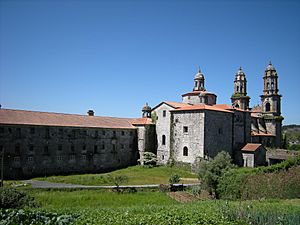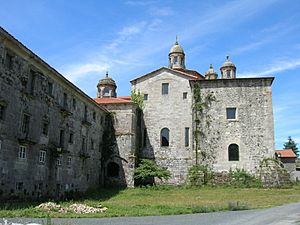Sobrado Abbey facts for kids
Quick facts for kids Sobrado Abbey |
|
|---|---|
|
Mosteiro de Santa María de Sobrado dos Monxes
|
|
 |
|
| Religion | |
| Affiliation | Roman Catholic Trappist |
| Ecclesiastical or organizational status | Monastery |
| Patron | St Mary |
| Location | |
| Location | Sobrado (A Coruña), Spain |
| Architecture | |
| Architectural style | Cistercian, Baroque |
| Type | Cultural |
| Criteria | ii, iv, vi |
| Designated | 2015 (32th session) |
| Parent listing | Routes of Santiago de Compostela: Camino Francés and Routes of Northern Spain |
| Reference no. | 669bis-016 |
| Region | Europe and North America |
| Type | Non-movable |
| Criteria | Monument |
| 3 June 1931 | |
| RI-51-0000547 | |
Sobrado Abbey is an old and important Cistercian monastery in Galicia, Spain. It is also known as Monasterio de Santa María de Sobrado de los Monjes in Spanish or Mosteiro de Santa María de Sobrado dos Monxes in Galician. This historic building is located in the town of Sobrado. It sits about 540 meters (1,770 feet) above sea level.
Contents
History of Sobrado Abbey
Early Beginnings (952-1142)
Sobrado Abbey was first started in the year 952. A count named Hermenegildo Alóitez and his wife Paterna founded it. In 958, they gave the land of Présaras to the monastery. Hermenegildo even became a monk there and lived the rest of his life at the abbey. He was buried there when he died.
The abbey was passed down through his family for almost 200 years. Then, in 1142, two important brothers, Fernando and Bermudo Pérez, gave the abbey to the Cistercian monks. These monks came from a famous monastery called Clairvaux Abbey in France.
Growth and Decline (12th-15th Centuries)
The abbey became very successful in the 12th and 13th centuries. It grew so much that it was able to help start another monastery, Valdedios Abbey, in Asturias. Sobrado Abbey also took over the care of Monfero Abbey when it joined the Cistercian group.
After a time, the abbey faced some difficulties and became less powerful. However, in 1498, Sobrado was the first abbey in Galicia to join a new Cistercian group in Spain. This helped it to become strong again.
Rebuilding and Modern Times (1708-Today)
A large and beautiful new church was built at the abbey. It was finished in 1708 and has a special style called Baroque. Many other buildings at the monastery were also rebuilt around this time.
Sadly, in 1835, the government ordered that many monasteries, including Sobrado, be closed down. This was part of a plan by a leader named Mendizábal. The abbey was left empty and started to fall apart.
But the story didn't end there! In 1954, a group of Cistercian monks, called Trappists, began to fix up the abbey. They had already restored another monastery in 1929. By 1966, the monks were able to move back into Sobrado Abbey and start a new community there.
Buildings of the Abbey
The church you see today at Sobrado Abbey was built in the late 1600s and early 1700s. It has several domes and rounded roofs. However, one part, the Magdalene Chapel (Capela da Madalena), is much older, dating back to the 14th century. The sacristy, which is a room where priests prepare for services, was designed by a famous architect named Juan de Herrera.
The monastery has three cloisters, which are open courtyards surrounded by covered walkways. These were used by the monks for walking and quiet thinking. Some parts of the original medieval buildings are still standing, like the old kitchen and the chapter house. The chapter house is where the monks would meet to discuss important matters.
See also
 In Spanish: Monasterio de Santa María de Sobrado para niños
In Spanish: Monasterio de Santa María de Sobrado para niños
 | George Robert Carruthers |
 | Patricia Bath |
 | Jan Ernst Matzeliger |
 | Alexander Miles |


